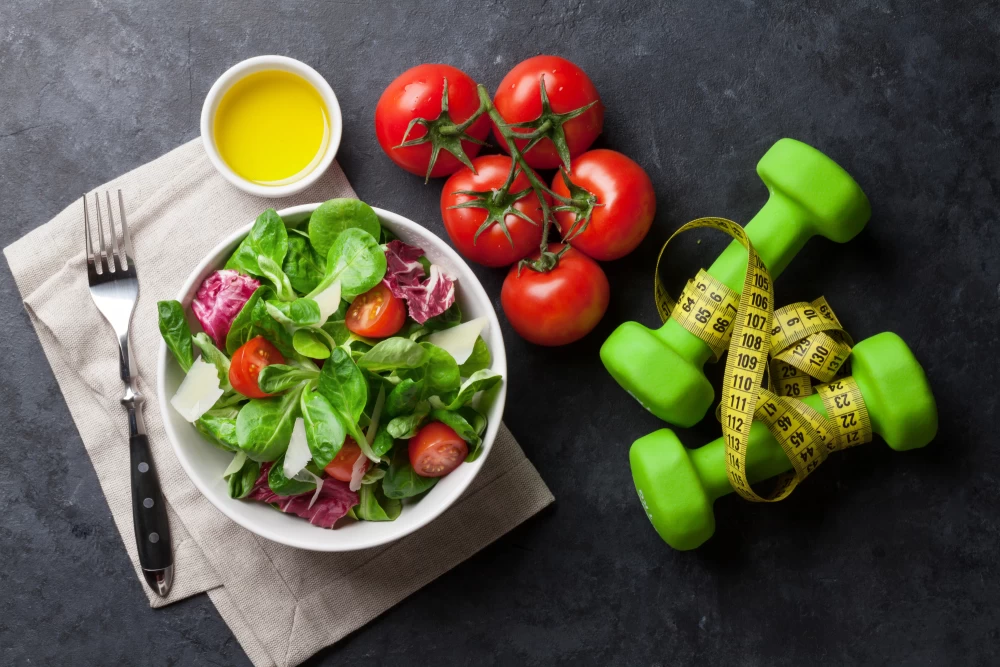
- 18th July 2023
Table of Contents
- The significance of fitness and healthy lifestyles as we age
- Advantages of exercise for the elderly
- Enhanced stability, cognitive function, and longevity
- Senior exercise options
- Balance, flexibility, aerobic fitness, and strength training
- Ways to maintain your fitness as you become older
- The role of diet in promoting good ageing
- Consuming a healthy, nutrient-dense diet
The significance of fitness and healthy lifestyles as we age
Maintaining one's independence into old age necessitates a focus on both healthy ageing and physical fitness. Loss of mobility and consequent loss of autonomy can result from a lack of physical activity. Chronic disorders including heart disease, stroke, and diabetes can all be warded off by regular exercise.
It has been shown to boost memory and decrease the likelihood of mental illness. Having a balanced diet and plenty of water are also essential for healthy ageing. Nutritionally dense foods that give appropriate energy are especially important for seniors who may have diminished appetites or difficulties swallowing. Dehydration can lead to serious problems including infections and renal damage, so staying hydrated is crucial.
In conclusion, encouraging good ageing and fitness for seniors can aid in their continued autonomy while decreasing their vulnerability to age-related chronic diseases and other health issues. We can help seniors live happier and healthier lives by promoting physical activity and making sure they get enough to eat and drink.
Advantages of exercise for the elderly
Seniors who don't exercise regularly are less likely to age healthily. Numerous studies have shown that regular exercise has positive effects on health, particularly in the areas of cardiovascular function, bone density, and muscular strength. Chronic diseases like diabetes, arthritis, and heart disease can all be averted with the help of a regular exercise routine.
Seniors can benefit from exercising not only in terms of their physical health, but also in terms of their mental well-being and brain power. There is evidence that regular exercise can help older persons feel happier and less depressed. By boosting brain circulation and encouraging the development of new brain cells, it can also aid in the preservation of cognitive ability.
Overall, a senior's physical and mental well-being can benefit from a consistent exercise routine far into old age. There are several benefits to physical activity for elders, including reduced risk of chronic diseases, better mental health, and enhanced cognitive performance.
Enhanced stability, cognitive function, and longevity
Maintenance of physical and mental health as well as increased longevity are essential components of healthy ageing. Strengthening muscles, boosting flexibility, and enhancing coordination are all benefits of regular exercise that might help with balance.
The risk of falling is decreased alongside increased mobility and autonomy. Exercising not only improves seniors' physical health, but also their emotional well-being. Endorphins are released through exercise, lowering stress and improving mood. Cognitive abilities like memory and focus may also benefit. Last but not least, seniors who engage in regular physical activity tend to live longer.
According to the best dietician in Dwarka, Dr. Pankaj Kumar, people who engage in regular physical activity had a higher survival rate than their less active counterparts. Seniors who exercise regularly have a lower chance of developing life-threatening conditions like heart disease and diabetes and may live healthier lives for longer.

Senior exercise options
In order to keep their minds and bodies healthy, seniors can take part in a wide range of activities. Aerobic exercise is one example because it raises the heart rate and is good for the cardiovascular system. Aerobic exercises include running, bicycling, swimming, dancing, and aerobics classes.
Maintaining muscle mass and bone density with strength training is also crucial for the elderly. Strength training exercises can be performed with the help of a trainer and resistance bands, free weights, or weight machines. Finally, regular flexibility and balance training can lessen the likelihood of injuries and boost your mobility.
Seniors can benefit from the stress reduction and physical benefits of yoga, tai chi, and Pilates. It is recommended that seniors engage in a programme of moderate-intensity aerobic activity, weight training, and balance/flexibility exercises for at least 150 minutes each week.
Balance, flexibility, aerobic fitness, and strength training
Aerobic, weight training, flexibility, and balancing activities should all be a part of your regular fitness routine as you age. Cardiovascular fitness and stamina can be enhanced with regular aerobic exercise like brisk walking or swimming. For optimal health, seniors should engage in aerobic activity three times a week for at least 150 minutes.
Muscle mass and bone density tend to decrease with age, but strength training techniques like lifting weights and utilising resistance bands can help counteract this reduction. At the very least twice a week, senior citizens should work on strengthening their muscles. Exercises like yoga and stretching can help increase flexibility and decrease the risk of injury.
Seniors should stretch regularly, but especially before and after physical activity. Finally, stability and coordination can be enhanced with balance exercises like standing on one leg or heel-to-toe walking. Balance exercises should be done at least three times a week by seniors. Incorporating different forms of exercise into a regular regimen is beneficial for seniors' health and fitness in many ways.
Ways to maintain your fitness as you become older
Maintaining physical activity is important at any age, but especially as you become older. In addition to lowering the risk of chronic diseases like diabetes, heart disease, and some malignancies, regular exercise helps preserve muscle mass and bone density, improves balance and coordination, increases cardiovascular health, boosts mood, and so on. If you want to stay active as you become older, consider these suggestions.
1. Begin slowly; it's best to ease into physical activity by doing something as easy as walking or swimming.
2. Consider taking part in a group fitness class, where you may meet new people and get in shape at the same time. Water aerobics, dancing lessons, yoga, and Pilates are also popular alternatives.
3. Include strength training in your routine: regular resistance training helps preserve muscle mass and bone density, both of which play a role in warding off falls and fractures.
4. Find a workout buddy; working out with a friend can boost your motivation and make your workouts more fun.
5. Variety is the spice of life, so if you're bored with the same old workout routine, try something new.
6. Physical activity is a cornerstone of healthy ageing. By making these changes to your lifestyle, you can enjoy good health long into your senior years.
7. Engage in regular physical activity and interact with others.
Seniors can maintain their health and mobility by incorporating activity into their daily lives. Physical exercise is beneficial since it enhances mobility, equilibrium, and health in general. Taking the stairs instead of the lift or going for a short walk around the block can do wonders for one's health.
The benefits of social interaction on one's psychological health cannot be overstated. Seniors can fight off feelings of isolation and despair by spending more time with loved ones, making new friends, and participating in community activities. Dancing and team sports are fantastic examples of activities that can boost both health and social connections.
In conclusion, maintaining a healthy lifestyle as one ages requires a commitment to both regular physical activity and social interaction. Not only do these things improve physical health, but they also make a big difference in how you feel emotionally. Seniors who make these kinds of pursuits a regular part of their lives report greater overall satisfaction with life.
The role of diet in promoting good ageing
As we age, our dietary requirements shift, and it becomes essential to maintain a healthy diet to ward off debilitating conditions such as diabetes, heart disease, and osteoporosis. Seniors can greatly benefit from incorporating a balanced diet rich in fruits and vegetables, whole grains, lean protein, and healthy fats.
This combination of nutrients can help them manage their weight, keep their minds sharp, and reduce their risk of developing conditions like dementia and diabetes. To ensure that seniors receive personalized and expert advice on their dietary needs, it is advisable to consult a qualified dietician near me who can provide tailored nutrition plans and guidance.
By seeking the assistance of a nearby dietician, seniors can take proactive steps to improve their overall health and well-being through proper nutrition. Good nutrition not only gives seniors the mental and physical stamina they need to continue their active lifestyles, but also encourages them to do so. Fall prevention and strong bones and muscles require consistent physical activity. Nutritional support for tissue repair and immunological function also aids in a speedier recovery time for elders after an injury or illness.
In conclusion, maintaining a balanced diet as you age is essential. Fruits and vegetables should make up a large portion of a senior's diet, whereas processed foods heavy in salt, sugar, or unhealthy fats should be avoided. Those who cannot get all the nutrients they need from food alone may benefit from taking nutritional supplements. Seniors can improve their health in general by making eating well a top priority throughout their retirement years.
Consuming a healthy, nutrient-dense diet
It becomes increasingly critical for elders to eat a nutrient-dense, well-balanced diet. Foods high in nutrients are beneficial for a number of reasons, including health of the muscles, bones, and brain. The elderly should have a balanced diet that includes a wide range of fresh produce, lean proteins, whole grains, and healthy fats.
Calcium is a nutrient that is very important for the elderly to consume. Osteoporosis and other bone-related problems can be avoided by eating a diet high in calcium-rich foods like dairy products and leafy greens. Sunlight exposure and fortified foods like milk and cereal are two good ways to get your daily dose of vitamin D, which is essential for bone health.
Eating a healthy, well-balanced diet is beneficial for seniors not only physically, but also psychologically. Antioxidants in berries may enhance cognitive performance, while omega-3 fatty acids in fish have been demonstrated to lessen the incidence of depression. It's never too late for seniors to make improving their meals full of nutrient-dense foods a top priority.














